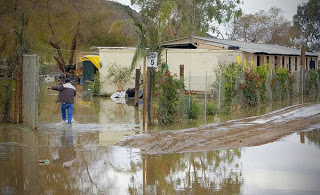
 SOUTH COUNTY — As the Tijuana River Valley dries out during a respite from two late-fall storms, city officials and border-area farmers and ranchers are assessing the damage.
SOUTH COUNTY — As the Tijuana River Valley dries out during a respite from two late-fall storms, city officials and border-area farmers and ranchers are assessing the damage.
Last weekend’s storm added to the pools of water, mud and debris in the river valley lingering from a Dec. 7 storm. That downpour was one of San Diego’s heaviest in years, dropping record-setting amounts of rain throughout the county. Fortunately, it wasn’t a repeat of last December’s devastating flooding from moderate rain that resulted in ruined crops, hay, equipment and the deaths of livestock.
Most people escaped without much damage from the most recent storms and said it could have been worse. They credited the city of San Diego for clearing trash and vegetation from clogged flood-control channels and preventing a repeat of last year. City crews also dredged sediment, which flowed down a large earthen berm recently built by the federal government.
However, at least a few locals say they suffered damage to fields and are losing money on property that can’t be rented while under water. Both say flooding from the recent storms came from a “pilot channel” off Hollister Street near Monument Road that breached its berm. City officials have not yet cleared out that section.
Wide stretches of the Kimzey Ranch on Hollister Street at Monument Road, including stables and pens where four horses and nearly a dozen goats drowned last December, were under about a half-foot of water or filled with mud this week.
“It wouldn’t have happened if the city would have cleaned the pilot channel out first,” said rancher Dick Tynan, who is losing about $2,600 per month in rent on land that’s “mucky.”
Farmer David Egger, who is suing the city for damages from last year’s flooding, said 10 acres of topsoil were ruined by Dec. 7 flooding. He estimates the loss at up to $100,000.
“Without the pilot channel cleaned out, it backs up and gets higher and higher and gets to a point where it goes over the top of those berms,” Egger said.
City crews began clearing out Tijuana River Valley channels in October after receiving emergency permits from the U.S. Army Corps of Engineers![]() SignOnSanDiego Topics Topics.
SignOnSanDiego Topics Topics.
Tony Heinrichs, director of the city’s Storm Water Department, said before the early-December storms, crews had been working seven days a week to clear out the 1,600-foot Smuggler’s Gulch flood-control channel. He said they had nearly completed the western portion of the 5,400-foot pilot channel but still must complete the eastern side.
“Had the rains not come, we thought by the end of this month we’d be finished,” Heinrichs said. “But now we have to wait a few days to dry out. If we have a week’s worth of good weather, we’ll be able to get back out there definitely by next week.”
Heinrichs said city crews’ top priority will be to clear the rest of the pilot channel and the sediment from Smuggler’s Gulch.
Horse owner Kim Warriner and her husband, Kirk Coles, checked out the Smuggler’s Gulch channel last week. It sits below an earthen berm made from 1.5 million cubic yards of dirt, the site of a new border fence. Homeland Security waived federal and state laws for the fence construction last year, including for drainage and erosion controls.
“This was 10 feet deep,” Warriner said. “Now, it looks like it’s been filled with 4 feet of sediment.”
The National Weather Service![]() SignOnSanDiego Topics Topics expects warm, dry conditions through at least Sunday. Long-range forecasters believe that a wet season is likely because of the emergence of El Niño conditions in the central Pacific. The heaviest rains may come in February or March.
SignOnSanDiego Topics Topics expects warm, dry conditions through at least Sunday. Long-range forecasters believe that a wet season is likely because of the emergence of El Niño conditions in the central Pacific. The heaviest rains may come in February or March.
Heinrichs said getting the work done quickly is the city’s goal. The emergency permit expires Feb. 15.
By Janine Zúñiga, UNION-TRIBUNE STAFF WRITER
